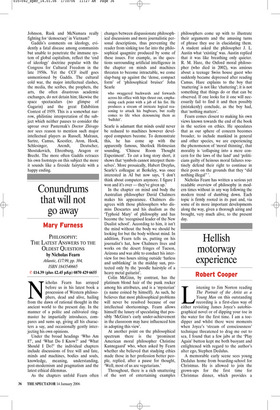Conundrums that will not go away
Mary Furness
PHILOSOPHY: THE LATEST ANSWERS TO THE OLDEST QUESTIONS by Nicholas Fearn Atlantic, £17.99, pp. 304, ISBN 1843540665 ✆ £14.39 (plus £2.45 p&p) 0870 429 6655 Nicholas Fearn has arrayed before us in his latest book a procession of Western philosophers, dead and alive, hailing from the dawn of rational thought in the ancient world to the present day. In the manner of a polite and cultivated ringmaster he impartially introduces, compares and sums up, giving all his characters a say, and occasionally gently interjecting his own opinions.
Under the broad headings ‘Who Am I?’, and ‘What Do I Know?’ and ‘What Should I Do?’ the individual chapters include discussions of free will and fate, minds and machines, bodies and souls, knowledge, meaning, understanding, post-modernism and pragmatism and the latest ethical dilemmas.
As the chapters unfold Fearn often changes between dispassionate philosophical discussions and more journalistic personal descriptions, thus preventing the reader from sinking too far into the philosophical quagmire produced by some of these issues. For example, as the questions surrounding artificial intelligence in the chapter on minds and machines threaten to become intractable, we come slap-bang up against the ‘dense, compact form’ of ‘philosophical bruiser’ John Searle
who swaggered backwards and forwards across his office with hips thrust out, emphasising each point with a jab of his fist. He produces a stream of intricate logical reasoning to attack his bugbears, but really comes to life when denouncing them as ‘bullshit’.
Searle is adamant that minds could never be reduced to machines however developed computers become. To demonstrate this, he has come up with the apparently famous, Sherlock Holmesian sounding, ‘Chinese Room Thought Experiment’. To cut a long story short, it shows that ‘symbols cannot interpret themselves’. More prosaically, Hubert Dreyfus, Searle’s colleague at Berkeley, was once interested in AI but now says, ‘I don’t think about computers anymore. I figure I won and it’s over — they’ve given up.’ In the chapter on mind and body the Australian philosopher David Chalmers makes his appearance. Chalmers disagrees with those philosophers who dismiss Descartes and his dualism as the ‘Typhoid Mary’ of philosophy and has become the ‘recognised leader of the New Dualist school’. According to him, it isn’t the mind without the body we should be looking for but the body without mind. In addition, Fearn tells us, putting on his journalist’s hat, how Chalmers lives and works on the desert fringes of Tucson, Arizona and was able to conduct his interview for two hours sitting outside ‘hatless and unblinking’ in the midday sun, protected only by the ‘poodle hairstyle of a heavy metal guitarist’.
Colin McGinn, by contrast, has the platinum blond hair of the punk rocker among his attributes, and is a ‘mysterian’ (a name coined by himself). As such, he believes that most philosophical problems will never be resolved because of our intellectual shortcomings. Fearn allows himself the luxury of speculating that possibly ‘McGinn’s early under-achievement in the classroom may have influenced him in adopting this view’.
At another point on the philosophical spectrum there is the ‘prominent American moral philosopher Christine Kannegaard’ who, when asked by Fearn whether she believed that studying ethics made those in her profession better people, replied, after a pause for thought, ‘Well, most of us are vegetarians.’ Throughout, there is a rich smattering of the sort of entertaining examples philosophers come up with to illustrate their arguments and the amusing turns of phrase they use in elucidating them. A student asked the philosopher J. L. Austin what ‘existing’ was. Austin replied that it was like breathing only quieter. R. M. Hare, the Oxford moral philosopher (who died in 2002), was anxious about a teenage Swiss house guest who suddenly became depressed after reading Camus. Hare explains to the boy that ‘mattering’ is not like ‘chattering’; it is not something that things do or that can be observed. If one looks for it one will necessarily fail to find it and then possibly (mistakenly) conclude, as the boy had, that ‘nothing matters’.
Fearn comes closest to making his own views known towards the end of the book in the section on ethics. He speculates that as our sphere of concern becomes broader, to include mankind in general and other species, we are experiencing the phenomenon of ‘moral thinning’, that morality is ‘collapsing into a mere concern for the laws of the land’ and ‘politicians guilty of heinous moral failures routinely defend their right to continue in their posts on the grounds that they “did nothing illegal” ’.
Nicholas Fearn has written a serious yet readable overview of philosophy in modern times without in any way following the modern trend of dumbing down. Each topic is firmly rooted in its past and, via some of its more important developments along the way, given a thorough airing and brought, very much alive, to the present day.














































 Previous page
Previous page